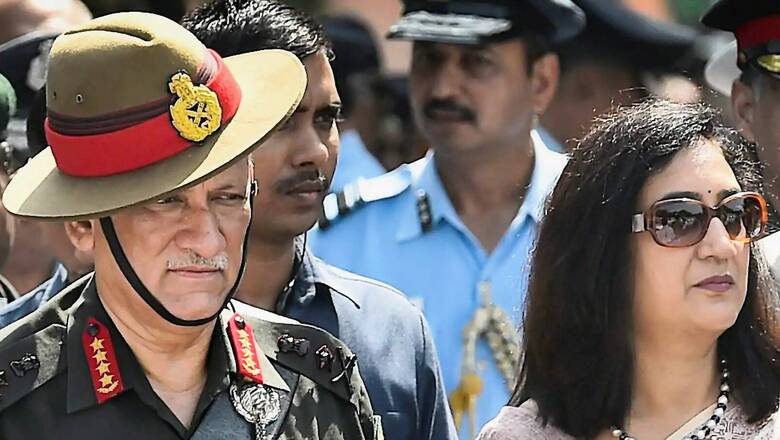
views
“Don’t ask me any cliché questions. Let’s talk about the future of warfare." These were General Bipin Rawat’s words to me during our last conversation, typical of his vigour and uninhibited personality. Over a cup of steaming chai, he promised me a long-pending sit-down interview. “I want the country to know why theatre commands are needed," he said.
After all, unifying the existing 17 commands of the Army, Navy and Air Force into three eastern, western and northern theatre commands was one of the major reforms initiated by General Rawat as the country’s first Chief of Defence Staff. On January 1, he would have completed two years in the position.
I first met General Bipin Rawat the day he took over as the Indian Army chief on December 31, 2016. He had a schedule packed with interview slots for all major news networks. I got up for my turn, mindful of the General’s busy calendar. But, the General got up too and reached for a framed certificate to show to me – a PhD in media-military ties, symbolic of his professional friendship with me and the fraternity at large.
On December 30, 2019, the eve of his retirement as Chief of the Army Staff, defence correspondents knew he was the government’s pick to take over as the country first Chief of Defence Staff, but the General himself was adamant.
“Keep your walking shoes ready. I am retiring and going to the hills. You come and see me. Your village is close," he told me, a fellow Uttarakhand native.
But the hills would have to wait. General Rawat just moved offices in the South Block, setting up the Department of Military Affairs. But no matter what the role, he always had time for candid conversations during which he would even advise writing instead of “just being on TV".
General Rawat loved to engage in conversations and passionately elaborated on topics close to his heart. A casual remark on the Tirupati Temple idol in his office once stretched into a 20-minute conversation. A question on his trip to Russia was answered with a detailed account of vodka drinking officers and traffic jams. A 15-minute meeting with General Rawat was never 15 minutes.
And controversy never dampened the man’s frankness. He couldn’t care less. After all, he was a soldier first, committed to his force. An officer whose warmth, frankness and friendship I will miss now.
I couldn’t muster the courage to meet General Rawat’s bereaved daughters, who lost both their parents in the tragic helicopter crash on Wednesday. The nation mourns with them today, as do I.
The nightmare of a day wouldn’t end without more punches to the nation’s gut. Eleven other defence personnel travelling onboard the ill-fated chopper died in the crash.
At 11.35am, I had received a WhatsApp message from Brigadier Lakhbinder Singh Lidder, a second generation Army officer who had been on General Rawat’s staff for more than a year now. I realise now that it was moments before he boarded the Russian-made Mi-17V5 helicopter. At his 16-year-old daughter’s book launch last week, I had promised Brigadier Lidder that I would get her book reviewed. He was beaming that day, a proud father watching on as his daughter confidently took the stage to talk about her books and parents.
Brigadier Lidder’s father and mine were both in the Signals. We often exchanged stories about that while I waited in his office to meet General Rawat. The phone in his office would never stop ringing, but the Brigadier never let his composure, politeness or attention waver. He told me he had been approved for the rank of Major General ad would be out of Delhi soon.
The day was spent in camera lives describing the accident, getting confirmations on the deceased, gathering information on funerals and succession, but nevertheless, it has been a blur. One can’t do this job without forging bonds along the way. The people you meet on the job become a part of your story and you become a part of theirs.
General Rawat and Brigadier Lidder, it was an honour knowing you.
Read all the Latest India News here




















Comments
0 comment